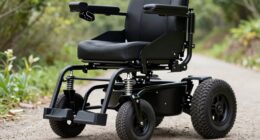Interviews with caregiving experts offer practical advice on handling emotional stress, building support networks, and communicating effectively with healthcare professionals. They emphasize the importance of self-care, setting boundaries, and accessing community resources to prevent burnout. Experts also highlight innovative strategies like mindfulness, online support groups, and targeted education to boost confidence and resilience. Staying informed through these insights can help you navigate caregiving challenges more smoothly; explore further to find the support you need.
Key Takeaways
- Experts emphasize emotional resilience and self-care strategies vital for caregiver well-being and stress management.
- Interviews highlight the importance of building support networks and accessing respite services to prevent burnout.
- Caregiving specialists recommend effective communication and education to improve care quality and caregiver confidence.
- Experts advise incorporating mindfulness, gratitude, and routine self-care practices to reduce stress and enhance mental health.
- Discussions often focus on leveraging community resources and technology to support long-term caregiving sustainability.
The Emotional Landscape of Caregiving for Chronic Liver Disease

Caring for someone with chronic liver disease often takes an emotional toll that can be overwhelming. You may feel resentment, guilt, sadness, or blame, which are all natural reactions. These feelings can lead to burnout, depression, and heightened stress, affecting your well-being and the quality of care you provide. Understanding the importance of emotional resilience helps you cope better with these challenges. Recognizing and validating your emotions—like frustration or anger—is essential for maintaining your mental health. Developing emotional resilience helps you cope better with these challenges. Strategies such as practicing gratitude, positive thinking, and seeking peer support can strengthen your resilience. Additionally, it’s important to monitor credit card statements to manage any financial stress that may arise from caregiving responsibilities. Implementing effective relaxation techniques can also help alleviate some of the emotional burdens associated with caregiving. For instance, finding a supportive community can provide valuable insights and encouragement to caregivers navigating these challenges. Moreover, embracing high vibrational energy can enhance your overall emotional well-being and help you cope more effectively with caregiving stress.
Building Support Networks and Community Connections

Building strong support networks and community connections can substantially ease the caregiving journey. Support networks, whether online or local, offer a space to share experiences, seek advice, and gain emotional support, helping reduce feelings of isolation. Implementing effective fraud prevention tools within these networks ensures that caregivers can safely share sensitive information and resources. Additionally, utilizing expert voice actors in community workshops can enhance the training experience for caregivers, making sessions more engaging and impactful. The integration of technology, such as intelligent tutoring systems, can further improve caregiver training by providing personalized learning experiences.
Connecting with these networks gives you access to valuable resources, training, and peer mentorship tailored to your needs. Studies show that caregivers involved in community support systems experience lower stress and better mental well-being. Through these connections, you can learn practical skills like medical tasks and self-care strategies from others who’ve faced similar challenges. Collaborating with organizations such as AARP or healthcare providers further strengthens your support network and keeps you informed about available resources, making your caregiving role more manageable and less overwhelming. Additionally, engaging with audiometric testing can help ensure that any hearing issues are addressed, facilitating better communication with those you care for. Participating in community events like Halloween celebrations can also provide opportunities for social interaction and bonding among caregivers.
Effective Communication With Healthcare Professionals

How can you guarantee your conversations with healthcare professionals are as effective as possible? Start by preparing a list of questions to ask and writing down key symptoms or concerns.
During visits, actively listen and ask for clear explanations to make certain of understanding. Including loved ones or other caregivers can strengthen the team approach, helping with decision making and care strategies. Additionally, consider the importance of early socialization in building a supportive environment, as it fosters better communication and trust among caregivers. Understanding the role of color accuracy in visual aids can also enhance the clarity of any materials used during discussions. Furthermore, being aware of financial needs can help ensure that caregiving plans align with available resources and support. It’s essential to assess potential pitfalls when adopting new caregiving technologies to enhance communication effectiveness.
Don’t hesitate to go back for follow-up visits if needed; effective communication builds trust and ensures you take care of your family member’s needs. Additionally, understanding the importance of regular maintenance can help caregivers address any potential issues early on, ensuring a smoother caregiver experience.
Self-Care Strategies to Prevent Burnout

To prevent burnout, prioritizing self-care is essential for caregivers. Engaging in activities like mindfulness, exercise, and hobbies reduces stress and boosts resilience. Scheduling daily “me time” and setting boundaries help you maintain mental health and prevent emotional exhaustion. Utilizing online support groups provides accessible emotional support and shared experiences. Reflecting on positive events and practicing gratitude enhance mood and resilience, keeping overwhelm at bay. Additionally, prioritizing personal health through regular checkups and stress management techniques sustains your long-term caregiving capacity. Incorporating sound design techniques into your self-care routine, such as listening to ambient sounds, can enhance relaxation and focus. Awareness of local store hours can also help caregivers plan their shopping trips more efficiently, reducing stress associated with time constraints. Furthermore, engaging in self-care activities like regular exercise can significantly improve your overall well-being and aid in stress relief. Implementing automation’s role in daily tasks can also help streamline responsibilities, giving caregivers more time for self-care. Moreover, exploring dynamic communication exercises can enhance understanding and connection with loved ones, further supporting emotional well-being.
| Self-Care Activity | Benefits |
|---|---|
| Mindfulness & Meditation | Reduces stress, improves mental clarity |
| Physical Exercise | Boosts energy, relieves tension |
| Reflection & Gratitude | Enhances mood, builds resilience |
Utilizing Respite and Support Services

Finding the right respite resources can make a big difference in your caregiving routine. Support services, from in-home care to community programs, offer essential relief and help you stay healthy. Exploring local assistance options ensures you get the help you need when you need it most. Additionally, utilizing Gold IRAs for retirement planning can provide financial security for caregivers as they navigate their responsibilities. Understanding health effects of tea consumption can also promote well-being, helping caregivers manage stress effectively. For instance, having a gentle nature can aid caregivers in maintaining a positive environment, similar to how therapy dogs provide comfort and support. Furthermore, recognizing the health risks of high sugar can help caregivers make better dietary choices for themselves and those they care for. Implementing machine learning tools can also enhance the efficiency of caregiving services by improving data management and resource allocation.
Finding Respite Resources
Locating respite resources can feel overwhelming, but there are many options available to give you the break you need. Start by exploring healthcare providers and insurance plans like Medicaid and Medicare, which often offer respite services.
Community organizations and faith-based groups also provide culturally and linguistically tailored support, either through volunteers or paid caregivers. Using online directories such as AARP’s Caregiving Resource Locator can quickly connect you to local respite providers.
Planning ahead and scheduling regular “me time” helps prevent burnout and improves your well-being, ultimately enhancing the care you give.
- Contact your healthcare provider or insurance plan for available respite options
- Check local community centers and faith-based organizations
- Use online resources like caregiving directories
- Schedule regular breaks to maintain your health and energy
Benefits of Support Services
Utilizing support services like respite care offers significant benefits for caregivers, helping to ease stress and prevent burnout. When you access professional support, you’re more likely to improve your mental health and overall well-being.
These services give you temporary relief, allowing you to focus on your personal health and recharge. Many caregivers find that participating in support programs reduces feelings of isolation and helps them connect with others facing similar challenges, creating a sense of community.
Data shows that caregivers who use respite and support services experience lower depression levels and build resilience. By taking advantage of these resources, you can maintain your physical and emotional health, which ultimately leads to better care for your loved ones.
Support services are a crucial part of sustainable caregiving.
Accessing Local Assistance
Accessing local assistance is a practical step you can take to ease your caregiving responsibilities. Local resources are often available to provide relief and support, helping you manage your loved one’s needs more effectively.
Start by contacting your Area Agencies on Aging (AAA), which can connect you to in-home help, adult day programs, or short-term residential respite. Many states and counties offer subsidized or free respite programs tailored specifically for caregivers of individuals with chronic illnesses or disabilities.
You can also explore mobile and home-based services, like visiting nurses or home health aides, to handle medical tasks and personal care.
Additionally, online directories and helplines, such as the Eldercare Locator, can help you quickly identify local respite options, making support more accessible when you need it most.
Practical Tips for Managing Stress and Anxiety

Managing stress and anxiety as a caregiver can feel overwhelming, but simple, practical strategies can make a significant difference. Incorporate brief mindfulness techniques like diaphragmatic breathing or guided meditation during hectic moments to quickly reduce tension.
Engaging in regular gratitude practices, such as noting three positive events each day, can boost your mood and lower anxiety over time. Use mobile apps focused on relaxation, deep breathing, or mindfulness to access quick stress relief exercises whenever needed.
Connecting with online caregiver support groups or virtual communities enables you to share experiences and gain emotional support, reducing feelings of isolation. Ultimately, schedule short “me time” periods regularly to recharge.
These small steps help manage stress, improve mental health, and keep you resilient in your caregiving journey.
Empowering Caregivers Through Education and Resources

Access to educational tools like instructional videos and tailored training programs boosts your confidence and skills in caregiving tasks.
Resources such as legal guides and doctor’s questions help you make informed decisions and handle complex health needs.
Connecting with support groups and expert guidance empowers you to provide effective, stress-free care.
Accessible Learning Tools
Have you ever wondered how caregivers can gain the skills they need without attending lengthy in-person classes? Accessible learning tools make this possible. Resources like instructional videos and online modules from organizations such as AARP’s Home Alone Alliance provide practical training for tasks like transfers and wound care.
These tools serve as valuable refreshers you can adapt to your unique situation, boosting your confidence and ensuring safety. Many materials come in multiple languages, helping diverse caregivers access essential information and improve health literacy.
Digital platforms let you learn at your own pace, saving time and reducing stress. By using these tools, you can enhance your skills, feel more prepared, and deliver better care.
- Instructional videos and online modules
- Multilingual educational materials
- Self-paced digital learning platforms
- Practical, adaptable training resources
Tailored Support Strategies
Tailored support strategies play a crucial role in empowering caregivers by providing personalized education and resources that meet their unique needs.
By recognizing your individual profile—considering your age, ethnicity, and the severity of the condition—you can access customized tools that suit your specific situation. Resources like instructional videos and legal tools such as “Five Wishes” help you confidently manage medical tasks and decision-making.
Connecting with online communities and support groups offers shared learning and emotional resilience through peer support.
Targeted training in procedures like transfers and wound care addresses your knowledge gaps, boosting your competence.
Additionally, partnering with disease-specific organizations and seeking expert guidance allows you to develop personalized care plans, ultimately improving your caregiving effectiveness and confidence.
Empowerment Through Knowledge
How can you feel more confident in your caregiving role? Gaining knowledge is key. Access to targeted education and resources boosts your competence in managing complex health tasks.
Watching instructional videos from sources like AARP’s Home Alone Alliance can teach you practical skills such as transfers and wound care.
Understanding legal documents like Five Wishes helps you make informed decisions and advocate effectively.
Tailored educational programs that consider your cultural and demographic background make learning more relevant and empowering.
Plus, ongoing education and easy-to-access resources help you navigate healthcare systems confidently, reducing feelings of helplessness.
Staying informed enables you to provide better care and advocate for your loved one’s needs, turning uncertainty into empowerment.
- Use instructional videos for hands-on training
- Learn legal documents to make informed decisions
- Seek culturally tailored educational programs
- Access ongoing resources for confidence
Frequently Asked Questions
What Are the Questions Asked in Caregiver Interview?
When you’re asked questions in a caregiver interview, they usually focus on your relationship to the patient, your daily responsibilities, and how you manage emotional stress.
You might be asked about the resources you access, your understanding of the medical condition, and how you coordinate with healthcare providers.
Expect questions about your self-care, mental health, family dynamics, and how caregiving affects your personal and professional life.
How to Pass a Caregiver Interview?
To pass a caregiver interview, focus on showcasing your relevant skills and experience. Highlight specific examples of handling medical tasks, communicating with healthcare professionals, and managing emotional stress.
Demonstrate your patience, problem-solving abilities, and adaptability. Show your knowledge of resources and your commitment to ongoing learning.
Be empathetic, reliable, and proactive, emphasizing your dedication. Prepare thoroughly, stay confident, and express genuine care for the person you’re going to support.
What Are the Top 3 Strengths of a Caregiver?
You might think technical skills are everything, but the top caregiver strengths truly lie in empathy, adaptability, and resilience. Your compassion helps build trust, while your flexibility lets you handle changing needs smoothly.
Resilience keeps you emotionally strong during tough times. Coupled with good communication and organization, these qualities guarantee you provide the best care possible, making a real difference in your loved one’s life.
What Are Signs of Caregiver Stress?
You might notice signs of caregiver stress through emotional changes like irritability, anxiety, or feeling overwhelmed.
Physically, you could experience fatigue, headaches, or sleep issues.
Behavioral shifts such as withdrawing from friends or neglecting your needs, and cognitive struggles like forgetfulness or trouble concentrating, are also common.
Recognizing these early signals helps you seek support and practice self-care to avoid burnout and maintain your well-being.
Conclusion
Remember, caring for someone often brings unexpected strength and connections you never anticipated. You might find support from someone unexpectedly, or a moment of clarity when you least expect it. Trust that your efforts matter, and small steps can make a big difference. Keep reaching out, learning, and caring for yourself—you’re more resilient than you realize. Sometimes, the most surprising support comes when you least expect it, guiding you through the toughest days.









